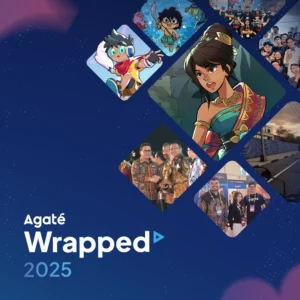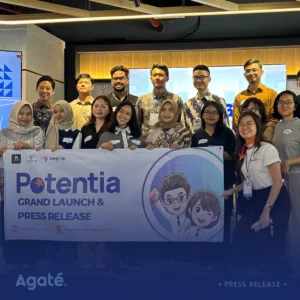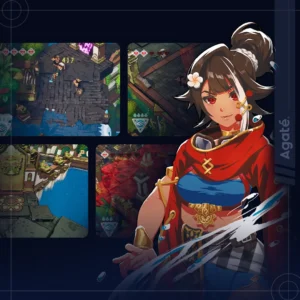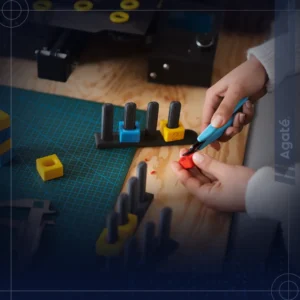MMORPG is an acronym that stands for massively multiplayer online role-playing game. It is a type of video game that combines elements of role-playing games with the gameplay of multiplayer online gaming worlds. MMORPGs are one of the most popular and diverse genres in gaming. They offer players the opportunity to explore vast virtual worlds, create unique characters, interact with other players, and engage in various activities, from combat to crafting. In an MMORPG, the player assumes the role of a character in a virtual world, often in a fantasy or science-fiction setting.
MMO vs MMORPG: What’s the Difference?
As mentioned before, MMO stands for Massively Multiplayer Online game. It means a game that you can play online with or against many other players. But MMO is not a genre by itself. It’s like saying a game is multiplayer. It doesn’t tell you what kind of game it is.
An MMORPG is a game that you can play online with or against many other players, and it also has role-playing elements. You can create a character, level up, complete quests, join guilds, and so on. So, MMORPG is a type of MMO game, but not all MMO games are MMORPGs. It’s important to know the difference between MMO and MMORPG because they are not the same thing. If you tell another gamer that you are playing an MMORPG, they might expect you to talk about your character, your skills, your quests, and so on.
But what makes a good MMORPG game? Is it because of its engaging gameplay mechanics or its strong community? There is no definitive answer to what makes a good MMORPG, as different players may have different preferences and expectations. Some of the common factors that many players consider when choosing an MMORPG are the story, the content, the progression, the combat, the community, and the monetization. Let’s take a look at some of the factors.
Gameplay
At the core of any successful MMORPG is engaging gameplay that keeps players hooked. This includes a well-designed combat system, diverse character classes, and a variety of quests and activities. A good MMORPG should offer a balance between challenging and rewarding gameplay, ensuring that players feel a sense of accomplishment as they progress through the game.
The most important element of any video game is immersive gameplay. It should keep players engaged and challenged at all times. It should also encourage teamwork and communication, as playing with others can be more fun and rewarding than playing alone. But above all, gameplay should be smooth with no glitches and bug-free so that players can enjoy the game without interruptions. Whether they are fighting with friends against other teams or exploring the underworld by themselves, players should feel fully immersed in the game world.
Expansive Game World
A good MMORPG should have an immersive world and rich lore. The game world should be carefully designed, with great landscapes, unique creatures, and lively cities. The lore should be deep and compelling, giving players a sense of purpose in the virtual universe. A good MMORPG should also offer a variety of locations to explore, from ancient ruins and hidden treasures to epic battles and quests. The game world should be a place that players want to dive into and discover. A good MMORPG should also have a sandbox-style game world where players can find items, meet other characters, and complete quests. New players should enter the same game world as others, creating a shared experience.
Community
One of the defining characteristics of MMORPGs is the ability to connect and interact with a vast community of players from around the globe. A good MMORPG fosters social interaction, providing various avenues for players to communicate, collaborate, and form alliances. Robust chat systems, guilds, player-versus-player (PvP) competitions, and cooperative gameplay are all vital components that encourage socialization.
A strong community is a crucial component of a successful game. MMORPGs thrive on social interaction, and they should offer: active forums, in-game chat systems, and social features that encourage players to form friendships, join guilds, and collaborate on quests. A good MMORPG should foster a sense of camaraderie and teamwork, making players feel like they’re part of something bigger than themselves.
Updates and Expansions
Updates and expansions are essential for MMORPG games because they keep the game world fresh and exciting. They add new content, such as quests, dungeons, and zones, that offer new challenges, rewards, and experiences for players. They also improve the quality and variety of the gameplay and immersion. Updates and expansions demonstrate the developers’ commitment to their player base and increase their loyalty and satisfaction.
A Fair and Balanced Monetization Model
A fair and balanced monetization model is important for MMORPG games because it affects the game’s revenue, reputation, and user experience. A monetization model is the way a game generates income from its players, such as by charging a fixed price, offering in-app purchases, or displaying ads. A fair and balanced monetization model should provide value to both the developers and the players without compromising the game’s quality or integrity.
Different MMORPG games may require different monetization models depending on their target audience, genre, platform, and features. For example, some MMORPGs may charge a premium price or a subscription fee to access the game, while others may offer a free-to-play or freemium model with optional in-app purchases. Some MMORPGs may also use a hybrid model that combines multiple monetization methods. The choice of monetization model should suit the game’s design and appeal to the players’ preferences and expectations.
A fair and balanced monetization model should also create a balanced game economy, especially for games that rely on in-app purchases. A game economy is a system of resources and currencies that players can earn, spend, or exchange in the game. A balanced game economy should motivate players to make in-app purchases without frustrating them or making them feel forced. A balanced game economy should also avoid practices that can harm the game’s reputation or user experiences, such as pay-to-win mechanics, excessive ads, or unfair pricing. A fair and balanced monetization model should enhance the game’s value and enjoyment for both the developers and the players.
Adaptability and Responsiveness to Player Feedback
Lastly, a good MMORPG should be adaptable and responsive to player feedback. This includes actively engaging with the community, soliciting feedback, and implementing changes based on player suggestions. A successful MMORPG should demonstrate a commitment to its player base by continually refining and improving the game experience.
Conclusion
In conclusion, a good MMORPG combines engaging gameplay mechanics, an expansive game world with immersive lore, a strong community, regular updates and expansions, a fair and balanced monetization model, and responsiveness to player feedback. However, it’s important to note that what makes a good MMORPG can vary based on individual player preferences and expectations. By focusing on these key ingredients, game developers can create immersive experiences that keep players coming back for more.






